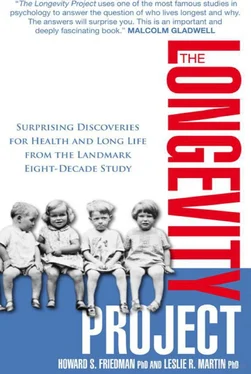We teamed up with Columbia University epidemiologist Renee Goodwin and looked at a nationally representative sample of thousands of Americans, in order to draw from a large body of evidence in a modern national study. As we now expected, unconscientious people were more likely to suffer from each of these chronic conditions. Individuals who measured low on conscientiousness were not only more likely to be clinically depressed, feel anxious, smoke cigarettes, and have high blood pressure and sciatica, but they were also more likely to have tuberculosis, diabetes, joint problems, and strokes. 11 11 For our study with epidemiologist Renee Goodwin, see R. G. Goodwin and H. S. Friedman, “Health Status and the Five Factor Personality Traits in a Nationally Representative Sample,” Journal of Health Psychology 11 (2006): 643-54.
Of course, many different things contribute to health and longevity : brushing your teeth and being perennially punctual are not the same as discovering the fountain of youth and drinking its dancing waters of healing. We knew this was not the end of our work on personality and health. We needed to know a great deal more about how conscientiousness combined with other traits and pathways to lead to better health and longer life. The surprising and paradoxical findings about cheerfulness, worrying, sociability, and other characteristics are in the pages ahead.
What It Means for You: Guideposts to Health and Long Life
Are conscientious and dependable people also boring and stale? We have found absolutely no evidence for this stereotype. Potential astronauts and military leaders who are slackers and screwballs are generally not the ones launched into space or put in charge of army commands. The careless and sloppy among us are not the ones usually selected to be judges and surgeons and heads of our most esteemed institutions. Many of the most conscientious Terman subjects led exciting and highly rewarding lives.
Conscientious, dependable people stay healthier and live longer. This is not always the case—there are many exceptions to be found—but conscientiousness is a very good predictor. If you are a conscientious person, the news is good—keep doing what you are already doing. If you are like Patricia, your habits, brain biochemistry, and social environment are likely to work together to decrease your risk of poor health and early death. You’re at much lower risk of becoming seriously ill, and you probably already worry enough about health-relevant habits and activities. But large numbers of people are not so conscientious. If this describes you, are you doomed?
No, but you’re not likely to change your personality or lifestyle rapidly. It doesn’t matter how many New Year’s resolutions you make. In fact, rapid and pervasive changes are usually quickly abandoned by anyone undertaking them. Lasting adjustments happen with smaller, but progressive, steps.
People can and do slowly change their patterns and their habits when they seek out situations that promote responsibility. For James, the transition took nearly a decade. In 1922 his conscientiousness score was in the lowest 25 percent of participants. His mother and schoolteacher described him as vain and noted that he lived wholly in the present, seeming never to look very far ahead. He wasn’t always reliable or truthful, either, according to these important adults in his life. Smart, like all of the subjects, James finished his freshman year of college at the age of seventeen, but he seemed bored by school and was performing far below his abilities. He took a year off (accomplishing little during that time) but at his family’s urging he returned to college and, after switching majors twice, finally graduated with a degree in communications.
When James was assessed in 1936 he was working steadily in public relations and had recently gotten married. We have hints from his family about his characteristics in early adulthood—his mother said he had money worries and his wife described him as a nonconformist, but not as impulsive. By the 1940 assessment, however, his conscientiousness score had moved into the upper 25 percent. He liked his work and was now more detail oriented and persistent and had definite goals. He was still somewhat vain, but James’s personality profile as he moved into midlife was much more prudent than it had been in his youth. And he survived to a seasoned old age.
James did not become more conscientious overnight. Based on what our data tell us, it is clear that as James gradually took on the responsibilities of a mature adult, he adopted more and more healthy habits. Yes, he maintained and even increased his physical activity, but that by itself wasn’t the key to his longevity. What mattered most was that he entered healthier social environments and relationships, which in turn fostered his health. As we will see in later chapters, his marriage was a good one (his wife agreed), and although his job in public relations wasn’t highly technical or exotic, he took pride in doing it very well. As an adult, he described himself as an honest person of high integrity. These new habits and relationships, paralleling his slow alteration in personality, provided a solid foundation for James’s health and long life. The next puzzle for us to solve would be why James succeeded in this way while others headed down more destructive paths.
CHAPTER 3
Friendly and Convivial
Healthy or Trivial?
Americans tend to view sociability and extroversion as desirable qualities—we worry about children who are shy. But being very sociable is not always a good thing. Social ties can cut two ways: sometimes healthy and sometimes harmful. For example, friends, acquaintances, and an extended family can be a lifesaver when facing difficult challenges, but the same folks might be bothersome pests if they are intruding when their help is not appreciated. (The comic George Burns is said to have joked that happiness is having a large, loving, caring, close-knit family… in another city.) On the other hand, loneliness and the absence of friends can be stressful and unhealthy—unless you are seeking solitude, calm, and self-reflection.
It seemed reasonable to assume that sociable kids would grow into healthier-than-average adults. Constructed in a similar manner to the Conscientiousness index, we created a Sociability index—a personality measure that combined childhood characteristics involving a tendency to prefer being around others: Was the child popular, a leader, fond of being in large groups? Did he or she show a preference for playing with others and being involved in social activities?
Take Paul, for example. He was a “yes” on all counts. Paul was a well-liked, optimistic, and fashionable fifth grader. Self-confident but also attuned to the opinions of others, he was both energetic and popular. Paul’s grades were good but his teacher described him as being “interested more in social activities than lessons.” He seemed happiest when working in a group, he loved to joke, and, despite being more selfish than average, he was a favorite among his classmates.
Looking across the decades, we found that the sociable children did not live longer. Some, including Paul, died young, while others did live into old age, meaning that on average there was no association between being sociable as a child and having a long life. After pondering the matter for six months, we finally figured out a way to get some insight into this paradox. The double-edged nature of sociability helped explain our surprising finding.
The Scientist-Businessman Continuum
In 1954, in one of the last studies he carried out before he died, Dr. Terman posed the question “Are scientists different?” He was wondering how to recruit more scholars to be scientists and also how to smooth relations between scientists and lawyers. (Not long after, the physicist and novelist C. P. Snow famously called the culture gap between scientists and humanists a gulf of mutual incomprehension.)
Читать дальше











